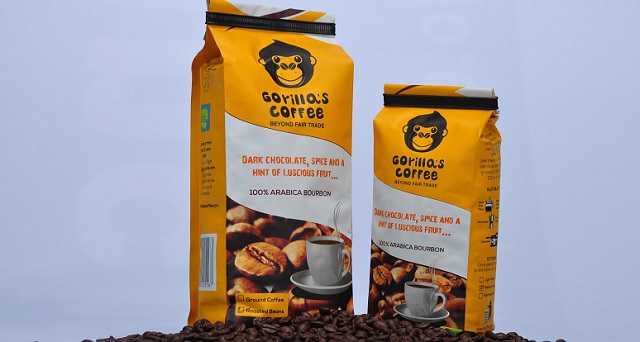
Advised to partner with global firms in U.S., Europe
Kampala, Uganda | STEPHEN NUWAGIRA | Coffee farmers always complain of low farm-gate prices, saying they earn little compared to the efforts and resources invested in the crop. As a result, some farmers have abandoned the crop in favour of other cash and food crops.
As coffee farm-gate price settled at Rwf264 per kilogramme of ripe cherries this April, some sector players attributed the low price to the fact that Rwanda’s coffee is mainly exported in an unprocessed form.
That is why ongoing initiatives that promote agro-processing are creating excitement among farmers anticipating premium prices for their beans.
One such initiative is a five-year partnership between Rwanda Farmers Coffee Company (RFCC), a local coffee processor and exporter, and Global Food, a US-based firm.
The partnership that was facilitated by National Agricultural Export Board (NAEB) supports the Beyond Fair Trade model of RFCC, and will see the processor export $306,000 or Rwf246.2 million worth of roasted coffee beans to the US market this year.
The firm trades under the Gorilla Coffee brand. “This will not only increase the country export revenues, but will also greatly support farmers,” according to Eric Rukwaya, the sales and marketing manager of Rwanda Farmers Coffee Company (RFCC).
The agreement will benefit 5,452 farmers in six coffee cooperatives, helping to improve their earnings and livelihoods. Over 355,000 households depend on coffee, and Rwanda mainly grows Arabica coffee.
Rukwaya says the partnership has given the firm a platform to access the big US market, noting that it is hard to penetrate such markets which already have big players from across the globe.
He says that roasting increases value of coffee to between $8 and $12 per kilogramme on the world market compared to about $4.5 for green coffee beans. This benefits farmers in terms of better prices and incentives, the official adds.
In late April, Rwanda Farmers Coffee Company shipped a consignment of 10 tonnes of roasted coffee worth $77,000(about Rwf66.2 million) to the U.S. under the partnership with Global Food.
This is highest volume of roasted coffee beans ever shipped to the U.S. from Rwanda, according Rukwaya. He adds that the same amount of coffee could have fetched only $42,000 (Rwf37 million) if the beans were exported in raw form (green).
Rwanda earned US$64.1 million (about Rwf55.3 billion) from coffee exports in 2017. Value addition is one of the targets of the second Economic Development and Poverty Reduction Strategy, the country’s development blueprint.
According to Rukwaya, local farmers and stakeholders have no choice but to embrace processing to earn more and also make the sector more competitive.
Bishop Theobald Samedi, a representative of Global Food in Rwanda, says it is important for local exporters to partner with global firms to ease their market entry, especially to the U.S. and Europe.
“This way, we shall be able to improve our exports and foreign exchange which will contribute to national development.”
Samedi says the organisation is supporting farmers to improve production capacity and quality, adding that they are targeting 36 tonnes of coffee this year.
He adds that the organisation supports government’s programmes geared at increasing exports, creating new jobs, and fighting poverty among the masses.
Pure Rwanda coffee The firm buys green beans from farmer cooperatives and roasts them at its Kigalibased plant. Previously the firm used to sell coffee blended with that of other origins, including Brazil, Costa Rica, Kenya, and Colombia.
“But now we market purely beans that originate from Rwanda, thanks to support from government through the Export Growth Fund managed by Rwanda Development Bank (BRD),” says Rukwaya, adding that processing and market the country’s coffee to global buyers requires a lot of investment capital.
The country’s specialty coffee is sourced from selected washing stations and cooperatives to maintain the quality of the beans. The new approach is a departure from passive marketing, where exporters would wait for buyers. “We have started taking the crop to buyers through exhibitions and other marketing approaches.
This way, the buyers are able to examine the quality of the beans and also taste the coffee with us before making buying decisions,” Rukwaya explains.
He is optimistic that the strategy will help the country to boost coffee export volumes and revenues, going forward, which will boost incomes and living standards of farmers. Last year, RFCC exported 4.5 tonnes of coffee worth $36,000 to different markets, including the UK, Germany and South Korea.
“We target to export about 40 tonnes worth $320,000 (Rwf273.6 million) this year.” Supporting farmers Rukwaya says some of the profits are reinvested in farmer support programmes, including provision of inputs like fertilisers and seeds, training, as well as loan guarantees from BRD. In addition, two cooperatives that supply green beans to the firm have received Rwf10 million worth of support.
A wastewater treatment facility was built for Sholi Coffee Cooperative coffee washing station in Muhanga District, while Gakenke’s Musana coffee washing station members and area residents were provided with clean water, says Rukwaya.
 The Independent Uganda: You get the Truth we Pay the Price
The Independent Uganda: You get the Truth we Pay the Price



I hereby introduce ourselves as M/S Musita Investments Limited kindly requesting to work with your good office in Customs Clearing and Transportation of both imports and exports at friendly and affordable prices.
We shall be so glad if highly considered.
Best Regards
Bridget